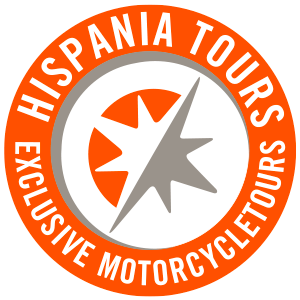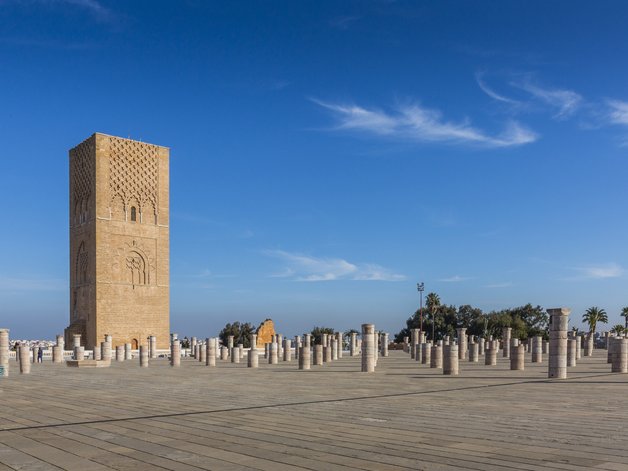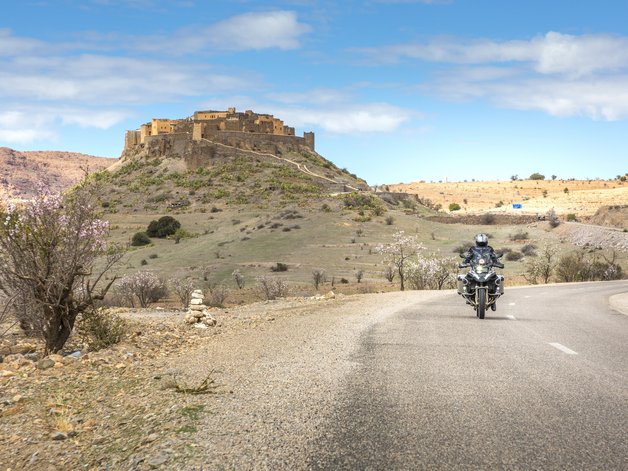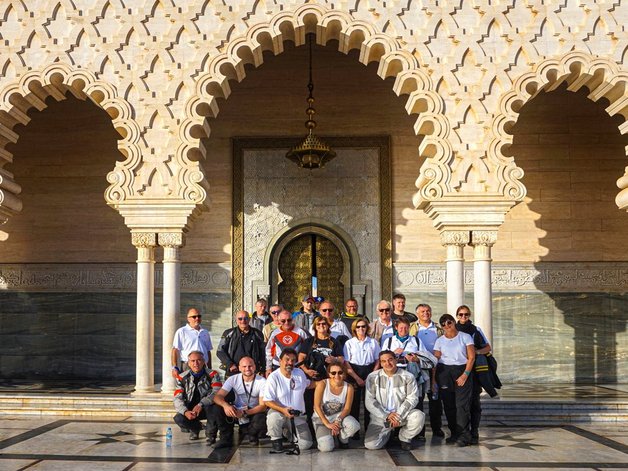Guided Motorcycle Tours in Morocco
Morocco, the most fascinating country in North Africa, is characterised by the eternal ocean, deserts and refreshing green oases, mighty mountain ranges and impressive cities. Immerse yourself with us and experience a unique motorbike trip to this country where time seems to have been at rest for centuries.
Morocco is a must for every motorcyclist - at Hispania Tours we offer you an unforgettable adventure in this fascinating and hospitable country with our long-standing experience and great attention to detail. Hispania Tours will make Morocco an unforgettable travel experience for you.
Frequently asked questions about motorcycle tours in Morocco
If you want to know more about our motorbike tours in Morocco, in our FAQs you will find answers to frequently asked questions. If you still have a particular request, we arey to hear from you. You can contact us here.
We have been travelling with our motorbike groups in Morocco several times a year since 2003 and have had nothing but the best experiences on site. If you follow the basic rules for tourists, Morocco is a safe country to travel. As a participant of our tour group, you will feel very comfortable in the cities as well as in the countryside. You can read more about how our tour participants have liked the country here.
Citizens of the European Union and the USA do not need a visa, only a passport. The passport must be valid for at least 8 months and have at least 2 completely blank pages. Entry using only an ID card instead of your passport is not possible. Participants from other countries than EU countries and USA must check the entry requirements for Morocco with their embassy.
Depending on your choice of motorbike for the tour, you should have at least two years of riding experience on a motorbike of a similar size. It is important that you are able to control your motorbike in any situation and handle it safely. Choose a motorbike model for the trip that is easy for you to ride, safe and comfortable, and where you can reach the ground with both feet without any problems.
In Morocco, the traffic rules are basically the same as in other European countries. It is advisable to drive rather defensively, as larger cars or trucks like to force their right of way. Indicators are often used sparingly or very late. Taxis in particular often stop at the side of the road without any indicators. Therefore, it is important to always leave enough distance to the road user in front. An alert and cautious driving style is mandatory, especially in urban areas.
Our motorbike tour in Morocco runs for the most part on well paved roads. On some hotel access roads or detours to viewpoints, we also ride on short natural or gravel roads. The condition of the asphalted roads is generally good, but they can be affected by traffic (pollution) and weather conditions (rain / wind). Some routes in the hinterland are also in a worse condition (potholes, disintegrating asphalt), but they are absolutely worth riding because of the scenic beauty. Your tour guide knows the routes well and will go into more detail about the road conditions during the morning briefing.
Depending on the time of year, temperatures in Morocco may range between 10 and 30°C, but during the riding days in the High Atlas Mountains or in bad weather it can sometimes get cooler. Temperatures may also change considerably within a single riding day. Therefore, it is advisable to always have an extra piece of clothing (rain suit) on the motorbike with you.
The duration of the daily stages on your Morocco tour depends on the destination to be reached. Normally we get on our motorbikes at around 9:00 am and reach our hotel at the destination at around 5:00 / 6:00 pm. Of course, sufficient breaks are planned during the day. In addition to coffee and lunch stops, we will also stop to take pictures or visit sights and viewpoints. On average, we ride between 250 and 300 km a day.
We recommend the BMW GS models, which are undoubtedly the most suitable for Morocco. Excellent safety, good comfort and, of course, lots of riding fun are the characteristics that distinguish the GS series in particular. Even in suboptimal road conditions or bad weather, these models are extremely reliable. Of course, all other models from our fleet are also available for touring in Morocco. Always have in mind, that it is extremely important to reach the ground with both feet and to keep stable. We have lowered models (1250 GS / 700 GS) and lowered seats for most bikes.
Yes, you can join the Morocco tour with your own motorbike. Please make sure that it is properly maintained and tyred for the tour. You will also need the appropriate documents and insurance for your motorcycle. The transport of the motorbike to the starting point of the tour has to be organised by yourself.
What equipment should I bring for the motorbike tour in Morocco?
Proper motorbike clothing is essential on the motorcycle tour in Morocco. This includes motorbike trousers and jacket with protectors, sturdy motorbike boots, leather gloves and a full face helmet. If your gear is not waterproof, we recommend you to bring a proper riding wetsuit. You can find helpful tips on this in our packing list!
The Moroccan currency is called Dirham and is best acquired in Morocco itself. Money can be exchanged at the border or in any Moroccan bank. There are ATMs in the larger towns and most hotel receptions also offer currency exchange.
Moroccan food is wonderful, because the custom is to have freshly prepared food at all times. Vegetables, fruits and meat are of local origin and exquisitely seasoned. On the menu we find specialities such as tajine (a braised dish in a Moroccan clay pot, preferably consisting of meat), couscous, Berber omelette and tasty grilled dishes. Morocco is of course also known for its honey-soaked desserts, delicious dates and fresh fruit.
Tap water should not be drunk anywhere and ice cubes in drinks should be avoided. We recommend drinking only packaged drinks, boiled water or water treated with water purification tablets. In any case, you will be provided with drinking water by our crew during the trip.
Can I come on the Morocco tour being a vegetarian?
Vegetarians do not have to starve in Morocco, instead they can choose from a wide range of vegetable dishes. In addition to a variety of vegetarian starters such as pickled olives, salads, pastes and grilled vegetables, the national dish tajine, a delicious stew, is also available as a meatless dish on many menus. And whether in the cities or out in the villages, you can buy fresh fruit and vegetables everywhere.
In Morocco, vegetarians do not have to go hungry, but can sample from numerous vegetable variations. In addition to a variety of vegetarian appetizers, such as pickled olives, salads, pastes and grilled vegetables, the national dish tajine, a delicious stew, is also available as a meatless dish on many menus. And whether in the cities or villages everywhere you can purchase fresh fruits and vegetables.
The rules that apply during Ramadan are intended for Muslims. This means, for example, that you do not have to fast from sunrise to sunset. However, out of cultural sensitivity, you should be careful not to attract negative attention in public by drinking or eating something visible to everyone. This could lead to conflicts with Muslims who take fasting very seriously.
Some restaurants close completely during the day and reopen just before sunset. However, in cities and resorts with a lot of tourists, you will find restaurants that welcome guests during the day. In the restaurants of your hotel, you will rarely have to deal with restrictions.
Morocco, located in the northwest of Africa, is only 13.5 km away from Europe. Mutual influences from Moroccan and European history and culture shape their connection to each other. In addition to the fascinating variety of landscapes and climates that range from forests in the north, fantastic beaches along the coast, to the Atlas Mountains and the Sahara Desert, Morocco is also home to lots of cultural treasures that are a must-see. Morocco and its inhabitants have seen many travellers pass by and are therefore used to dealing with foreigners. Therefore it is not surprising at all, to encounter hospitality wherever you go and to be invited to drink Moroccan tea made from fresh mint as a welcoming ritual.




